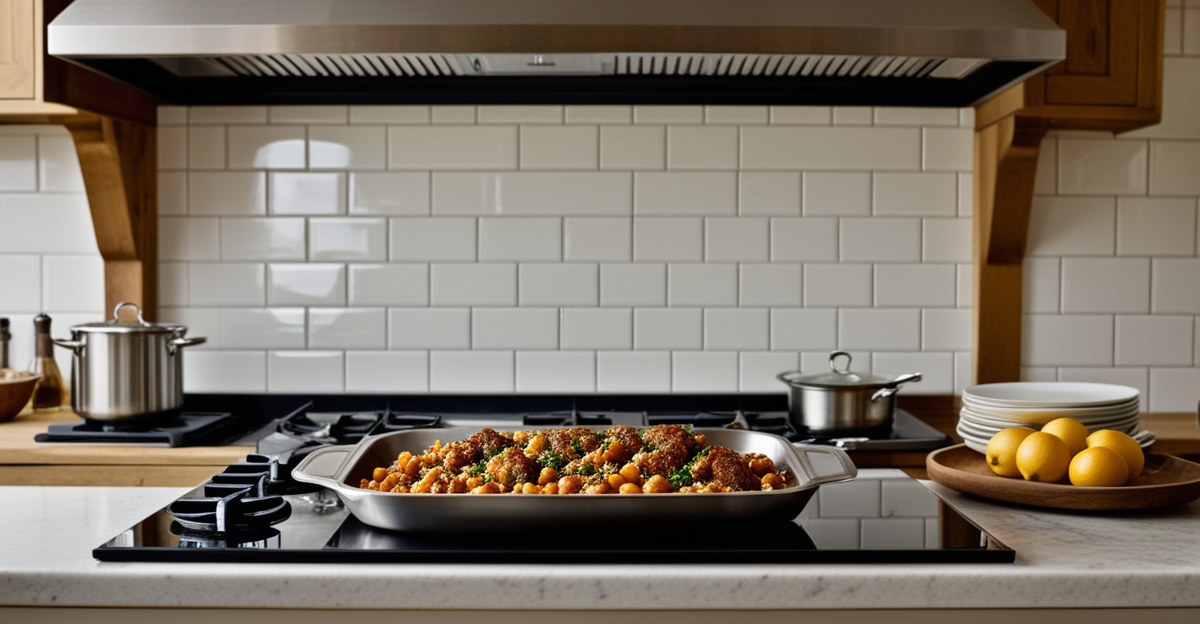Resurgence of Traditional British Cuisine in Modern Kitchens
The renewed interest in traditional British cuisine has become a significant culinary trend in modern kitchens. Recent reports reveal that British food revival is not just a fleeting fad but a lasting shift, with many chefs acknowledging a growing popularity of classic recipes. Modern kitchens now embrace the diversity and richness of traditional British dishes, blending old flavors with contemporary cooking techniques.
Several factors contribute to this resurgence. There is a widespread appreciation for the simplicity and comfort of British food, especially as people seek authentic, hearty meals. The role of culinary trends promoting sustainable, locally sourced ingredients aligns perfectly with traditional British cuisine, which relies heavily on staple regional produce. This intersection has propelled traditional recipes back into favor, with a fresh perspective that respects their historical roots.
Also read : How do you make a traditional Ploughman’s lunch?
Moreover, the British food revival benefits from a cultural reawakening, where nostalgic memories and a desire to preserve culinary heritage motivate both chefs and home cooks. This convergence of tradition and innovation makes traditional British cuisine a dynamic part of modern kitchen culture, reflecting evolving tastes without losing its essence.
Resurgence of Traditional British Cuisine in Modern Kitchens
Exploring why traditional British cuisine has found new life in modern kitchens reveals multiple driving forces. Recent data from culinary surveys indicate a robust increase in the popularity of classic British dishes, with chefs reporting heightened demand for timeless recipes in both casual and fine dining settings. This British food revival stems largely from a desire to reconnect with authentic flavors that evoke comfort and heritage, fitting neatly within contemporary culinary trends that prioritise sustainability and quality.
Additional reading : How do you achieve the ideal texture in a bread and butter pudding?
The surge is supported by the versatility of traditional British cuisine, which adapts well to modern dietary preferences while maintaining its identity. Chefs emphasize the importance of local sourcing as a crucial factor; regional produce from farms supports fresh, seasonal menus that highlight the best of British ingredients. Additionally, the ongoing revival benefits from the growing appreciation for culinary traditions passed down through generations, underscoring the cultural significance of these dishes beyond mere sustenance.
Together, these elements create a compelling case for traditional British cuisine as an integral part of modern kitchens. The British food revival reflects not only nostalgia but also a strategic realignment with culinary values relevant to today’s consumers, successfully balancing heritage with innovation.
Resurgence of Traditional British Cuisine in Modern Kitchens
Renewed enthusiasm for traditional British cuisine embodies a significant shift in culinary trends, particularly within modern kitchens. Recent industry data underscores a growing demand for classic British recipes, confirming that the British food revival is both noticeable and enduring. Leading chefs often point to the comfort and authenticity found in traditional dishes as key drivers behind this popularity surge.
Several critical factors explain this trend. First, the quest for simplicity and hearty flavour profiles reconnects people with familiar tastes that modern fast-food alternatives often lack. Second, the alignment with sustainability trends boosts the appeal of British cooking, as it heavily features locally sourced and seasonal ingredients. These elements not only promote freshness but also honour regional food heritage.
Moreover, culinary shifts in modern kitchens reflect a dynamic interplay between preserving time-honoured methods and adopting contemporary techniques. This fusion allows traditional British cuisine to evolve without losing its core identity, making it relevant and exciting to today’s cooks and diners alike. Collectively, these dimensions reinforce the ongoing resurgence of British culinary traditions on both professional and domestic stages.
Resurgence of Traditional British Cuisine in Modern Kitchens
The renewed interest in traditional British cuisine is deeply intertwined with evolving culinary trends reflecting a broader appreciation for authenticity and heritage. Recent surveys highlight that chefs in modern kitchens recognize a marked increase in customer demand for British food revival, with many viewing classic dishes as cornerstones of British culinary identity.
What factors contribute to this enthusiasm? Firstly, the focus on local sourcing elevates traditional British cuisine by showcasing fresh, regional ingredients, reinforcing sustainability values increasingly prized in modern kitchens. Secondly, the simplicity and heartiness of these time-honored recipes resonate with consumers craving comfort food that feels genuine. This appeal extends beyond nostalgia, engaging diners who seek meals with a clear cultural story and transparent sourcing.
Chefs express that embracing traditional British cuisine allows them to innovate without sacrificing authenticity, merging old and new culinary techniques. The British food revival in contemporary kitchens benefits from this synergy, as culinary trends promote dishes that are both familiar and refreshed. This alignment enhances the appeal of traditional recipes in restaurants and at home, ensuring their relevance in today’s diverse food landscape.
Resurgence of Traditional British Cuisine in Modern Kitchens
The British food revival is marked by a clear resurgence of interest in traditional British cuisine across both professional and domestic settings. Recent studies show that chefs increasingly incorporate classic recipes into modern kitchens, driven by evolving culinary trends that blend heritage with innovation. This shift reflects a move away from globalised food homogenisation towards celebrating distinct local flavours.
Key factors powering this rise include a growing consumer desire for authenticity and connection to food origins. Many chefs report that diners seek the comfort and familiarity found in traditional British dishes, which aligns with the wider culinary trend emphasizing seasonality and locality. The use of locally sourced ingredients reinforces ties to regional food heritage, making traditional recipes more relevant today.
Moreover, the flexibility of traditional British cuisine allows it to adapt to contemporary palates and lifestyle needs without losing its authentic essence. Modern kitchens fuse classic cooking methods with contemporary techniques, resulting in dishes that honor British culinary identity while appealing to diverse tastes. Together, these elements form the backbone of the ongoing renewal in British culinary appreciation.
Resurgence of Traditional British Cuisine in Modern Kitchens
The resurgence of traditional British cuisine in modern kitchens is driven by clear and measurable trends. Recent data illustrates a significant rise in consumer interest, with chefs reporting that classic British dishes now feature more prominently in menus across the UK. This renewed popularity signals a genuine British food revival that transcends fleeting culinary fads.
Chefs highlight that one key factor behind this shift is the growing alignment with broader culinary trends prioritizing sustainability and heritage. Traditional British meals, often built on locally sourced and seasonal ingredients, naturally fit this movement. This focus on quality produce enhances both flavour and authenticity, satisfying modern diners’ increasing expectations.
Additionally, the British food revival is supported by cultural factors: many diners seek connection through food to tangible history and identity. This trend prompts chefs in contemporary kitchens to revisit and reinterpret beloved recipes rather than simply replicate them, offering dishes that honour tradition while appealing to evolving taste preferences. The dynamic nature of this revival reveals how traditional British cuisine continues to adapt within modern culinary contexts, securing its place in today’s gastronomic landscape.
Resurgence of Traditional British Cuisine in Modern Kitchens
The renewed interest in traditional British cuisine is clearly reflected in both recent data and chef perspectives. Culinary surveys show a significant rise in demand for classic British cooking within modern kitchens, highlighting the British food revival as more than a trend—it is a lasting shift in eating habits and cooking practices.
Chefs emphasize that this popularity stems from several key factors. First, the desire for authentic, hearty meals that deliver comfort and familiarity stands out. Second, evolving culinary trends favoring sustainability and seasonality perfectly complement traditional recipes known for their use of locally sourced ingredients. This alignment is fueling the resurgence by marrying British food’s heritage with contemporary values.
Moreover, the versatility of traditional British cuisine enables it to adapt within modern kitchens without losing authenticity. Whether in home cooking or fine dining, chefs report that revisiting time-honored recipes meets diners’ growing appetite for meaningful, flavour-rich experiences tied to cultural identity. These factors collectively make the British food revival a vital part of today’s culinary landscape.
Resurgence of Traditional British Cuisine in Modern Kitchens
The renewed interest in traditional British cuisine in modern kitchens reflects both chef insights and data trends indicating that classic recipes are no longer confined to history but embraced as vibrant culinary choices. Recent industry surveys show a notable increase in restaurant menus featuring traditional British dishes, confirming the tangible rise in popularity central to the ongoing British food revival.
Chefs widely credit this resurgence to evolving culinary trends that value authenticity and sustainability, which align seamlessly with the roots of British cooking. The demand for meals featuring local, seasonal produce highlights a shift in consumer priorities toward freshness and ethical sourcing—key aspects of traditional British cuisine. Moreover, this revival is propelled by a communal desire for comforting, familiar flavours that resonate with cultural identity.
Additional factors underpinning the renewed appreciation include the adaptability of classic recipes, which modern kitchens tweak to satisfy contemporary tastes and dietary preferences while preserving heritage. These elements together position traditional British cuisine as a significant and growing influence in today’s culinary landscape, bridging past and present in a relatable, meaningful way.







